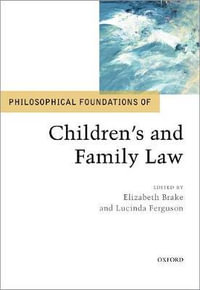Winner of the 2010 Pacific Sociological Association Distinguished Contribution to Scholarship Award
A lesbian couple rears a child together and, after the biological mother dies, the surviving partner loses custody to the child&;s estranged biological father. Four days later, in a different court, judges rule on the side of the partner, because they feel the child relied on the woman as a &;psychological parent.&; What accounts for this inconsistency regarding gay and lesbian adoption and custody cases, and why has family law failed to address them in a comprehensive manner?
In Courting Change, Kimberly D. Richman zeros in on the nebulous realm of family law, one of the most indeterminate and discretionary areas of American law. She focuses on judicial decisions&;both the outcomes and the rationales&;and what they say about family, rights, sexual orientation, and who qualifies as a parent. Richman challenges prevailing notions that gay and lesbian parents and families are hurt by laws&; indeterminacy, arguing that, because family law is so loosely defined, it allows for the flexibility needed to respond to&;and even facilitate &; changes in how we conceive of family, parenting, and the role of sexual orientation in family law.
Drawing on every recorded judicial decision in gay and lesbian adoption and custody cases over the last fifty years, and on interviews with parents, lawyers, and judges, Richman demonstrates how parental and sexual identities are formed and interpreted in law, and how gay and lesbian parents can harness indeterminacy to transform family law.
Industry Reviews
"Richman's exemplary scholarship reminds us of the incremental gains made by queer advocates and just how much work we have left in front of us." Law and Politics Book Review "This superb study renders a startlingly original verdict about the creative potential that inheres within the maddening indeterminacy of our family law. Richman is an incomparably astute and nimble guide through the thorny thicket of the judiciary's first half century of contradictory decisions in contests over child custody, adoption, visitation, and the dramatically shifting definitions of parent and family. Itself a model of judicious reasoning, Courting Change will enrich discourses on family transformation, law and society and critical legal studies and provide an invaluable resource for legal advocates of LGBT parent rights." Judith Stacey, New York University "You could learn about the law that governs LGBT parents and their children by reading all the 3 reported court opinions about them from the last half century - or you could read this one book. Through her analysis of majority and dissenting opinions and her interviews with lawyers, judges, and parents, Richman deftly demonstrates that the legal standard 'best interests of the child' and the terms 'family' and 'parent' necessarily - and imperfectly - evolve. The path forward requires understanding where we've been. Thanks to Richman, that path just got a whole lot clearer." Nancy D. Polikoff, author of Beyond (Straight and Gay) Marriage: Valuing All Families under the Law "No one has written more comprehendingly or searchingly about the topic of gay and lesbian custody and adoption than Richman. Courting Change is a must-read for scholars, students and activists interested in family law and lesbian and gay rights." Verta Taylor, University of California, Santa Barbara "Richman's extensive archive and innovative approach supplies an instructive guide to how scholars can integrate various approaches to the law to influence judges, legal advocates, and other interested parties." Law and Politics Book Review

























